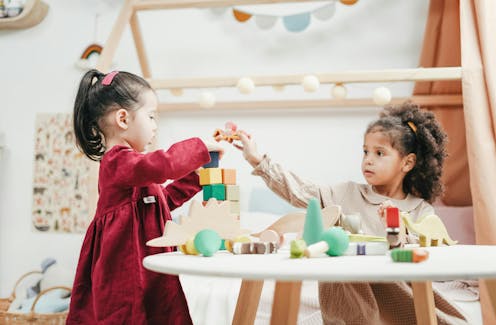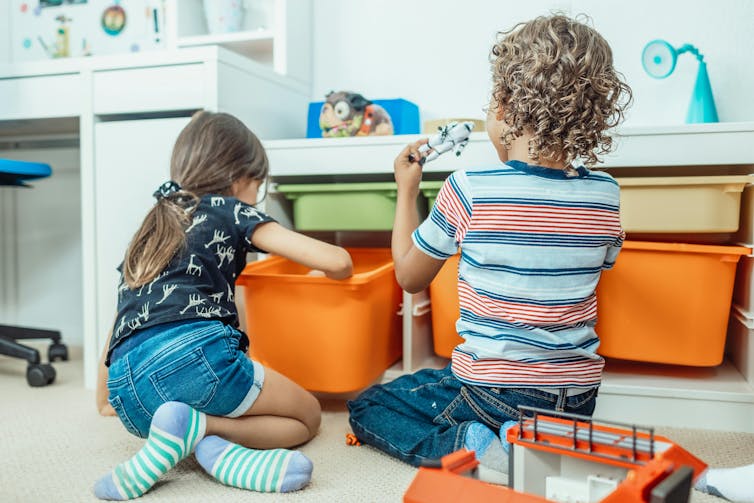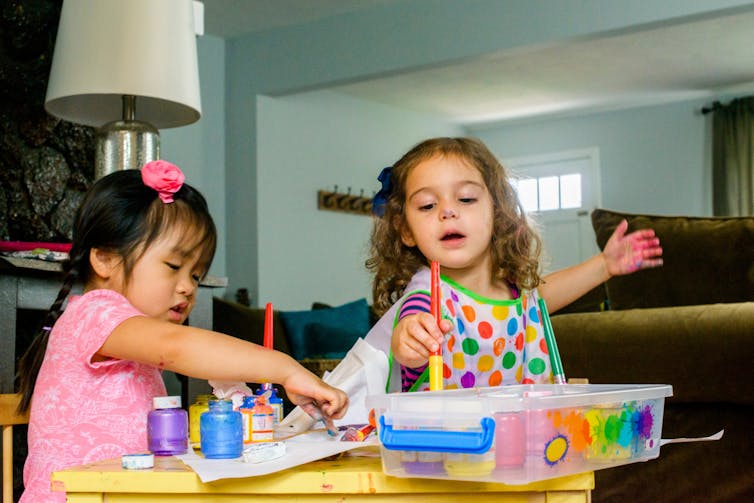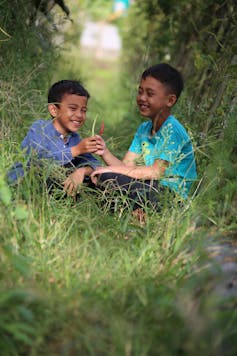Source: The Conversation (Au and NZ) – By Kimberley Beasley, Lecturer and Academic Chair in Early Childhood, Murdoch University

During school holidays, playdates can provide a brilliant opportunity for social interactions for both children and their parents. They can help children get to know kids at their current or future daycare and school.
So, what makes a great playdate – and how can parents make them less stressful?
Here are some things to consider.

Photo by Kindel Media/Pexels
Play is good for children
Play is how children learn and make sense of the world around them.
Through play, children can:
- develop their social and emotional skills
- practice sharing and taking turns
- get better at reading other children’s emotions
- learn to negotiate conflict
- solve problems
- navigate challenges
- develop thinking skills as they make up new games and encounter new ideas.
Play can support children’s executive functions, meaning the mental skills we use when we think flexibly, use our memory and practise self-control.
Play nurtures a child’s imagination, allowing them to build on each other’s ideas to invent new imaginary worlds. Imagination helps us develop the skills for abstract thinking.
Playdates can also help parents find support and understanding from someone going through the same thing. They can discuss challenges and share solutions for common parenting struggles, such as sleep routines and healthy meal ideas.
Offering your child a diverse buffet of playdate options
Playdates can also provide children with possibilities they can’t get in the family home. That includes giving them an understanding of our diverse communities.
So, it’s great for parents to put some intention into who their child plays with and who gets invited to a playdate.
Think about how diverse your child’s world is now and if you are limiting their world to people just like you. Is there an opportunity to open their world to the rich diversity they will experience in society as they grow?
It is important for children to value difference, embrace diversity and be exposed to different languages.
This can help children think about language, improve their cultural awareness and develop more flexible and inclusive social skills.

Connect Images – Curated/Shutterstock
A little planning can go a long way
Planning a playdate can be stressful. Parents can end up worrying about where to go, what to do, whether the house is tidy enough, or that you might be judged about the food you offer. Meeting in a public space such as a local park or playground can help.
Parents also worry their child might misbehave, not play well with others or announce they’re bored. But playdates are about giving kids a chance to learn social skills and resolve conflicts. When disputes arise, support them to identify their feelings and brainstorm solutions.
If you are meeting at home, think up some play activities that are open-ended and suitable for a range of age groups and interests. Examples include:
- painting
- drawing
- pavement chalk
- cutting and gluing from magazines
- playing or constructing things with cardboard boxes
- ball games with simple targets (like a saucepan or laundry basket)
- building blanket forts
- camping indoors or outdoors with a small tent.
For a playdate in a park, a nature scavenger hunt is fun – can the kids each find a feather? A gumnut? A special rock?

Catatan Effendy/Shutterstock
Another idea for an outdoor playdate might be a bush walk, where kids can learn to identify local native plants.
My own research has found many adults and children know very little about native plants.
Building this knowledge is important to be able to recognise toxic plants, as well to understand some Indigenous knowledges about the plants in our local environment.
Some can be used to make delicious drinks or to add to food, or to take the sting out of an ant bite.
Learning together with another family using a plant app such as Inaturalist can make learning more enjoyable.
Ditch the stress and don’t compare
During playdates, it is common for parents to compare their child with other children. They can end up stressing about milestones and if their child is “behind”.
Research shows while there are general milestones that most children will reach, this can happen within a broad timeframe. Usually, there’s nothing to worry about.
If you’re really concerned, your local child health nurse or your GP is the best place to go.
Instead of talking in depth about “milestones” during playdates, try chatting instead about local places to play, books you or your child enjoys or recipe ideas for families.
For a successful playdate, try to focus on the enjoyment of the children and supporting them to play.
Have in mind some activities suitable for the venue you choose. Then step back and let the children explore the world around them while they get to know each other.
![]()
Kimberley Beasley is a full-time academic in early childhood and primary education at Murdoch University. She owns a company called Childscapes, which designs nature playgrounds for childcare centres.
– ref. Holiday playdates are great for kids – but ditch the stress and don’t compare milestones – https://theconversation.com/holiday-playdates-are-great-for-kids-but-ditch-the-stress-and-dont-compare-milestones-243791





